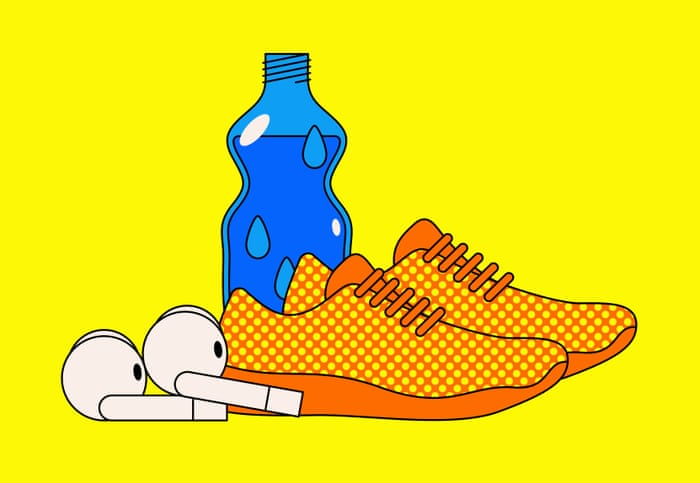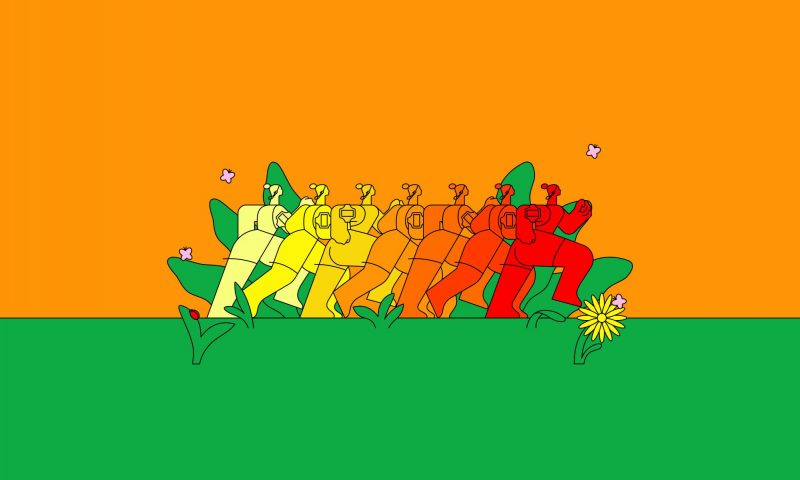How to use music to boost your running, whether over a mile or a marathon
Illustration: Thomas Hedger/Guardian
From music’s effects on fatigue to its motivational properties, the right soundtrack is a powerful tool for improving your ability to run well
by Alexi Duggins
Everyone knows there’s a link between music and running. Barely a gym lets a cross-training machine go unaccompanied by hi-NRG dance tunes. There’s a great choice of running playlists on Spotify, some with millions of likes from users who’ve found that the right music can push them farther and faster. Bruce Springsteen has even written a whole album about being born to run. But if you want to use music to help improve your running, it’s important to get to grips with the science, and how it applies to your running style.
Synchronising to music
The kind of music you listen to while running matters when it comes to synchronisation. Runners who put on their earphones when they exercise tend to synchronise their pace to what they’re listening to – which is why Spotify’s running playlists contain songs that share similar beats per minute (bpm). Dr Rachel Hallett from Kingston University, who has run a number of studies on the link between music and exercise, found about 33% of runners synchronise to their music deliberately, while 40% do it without meaning to.
Given that most runners tend to follow a pace of 150 to 180 steps per minute, you need music that corresponds to that. One option is to pick music that has about 150-180bpm, so that you can match your steps to the beat. “Foo Fighters’ The Pretender, which has about 170bpm, is really, really popular with runners,” says Hallett.
However, 150-180bpm is very fast in terms of tempo, so there’s relatively little recorded at those speeds – with the exception of more high-energy rock’n’roll, thrash metal or speed garage. So another option is to aim for music that matches your stride cycle – ie two steps rather than one. This lets you pick music that’s much slower. Something that’s particularly good? Hip-hop.
“Listening to rap music from 75 to 90bpm and taking a stride cycle on each beat is a match made in heaven,” says Costas Karageorghis, professor in sport and exercise psychology at Brunel University and author of Applying Music in Exercise and Sport. He adds: “It gets you into a steady rhythm, and if you’re interested in maximising your efficiency – by not going so hard at first that you flake out later – it can have an enhancing effect of 10 to 15%.”
Flow state
One of the most pleasant ways to run is to do so in what’s known as a “flow state”. It’s a highly enjoyable feeling of being completely immersed in what you’re doing to the point where it’s as though you’re on autopilot, but which is in itself highly enjoyable. It’s also been shown to enhance running endurance.
Karageorghis did a study where he ran people to exhaustion during a beep test and found that those who listened to music more easily entered flow state. But in order to enter flow state, it’s important to have the right listening experience. The more continuous the listening experience, the easier it is to enter flow state. So if you’re planning to go on a reasonably lengthy run, it’s best to avoid music with ads, and to ensure you’re not listening in a way that might be interrupted by poor signal. Using Spotify Premium, with ad-free music and offline listening, is one way to keep the flow state flowing, if you will. “Having interrupted music can be a little distracting and disconcerting – it’s not as beneficial as having continuous music,” says Karageorghis. “That’s why I often encourage people to create end-to-end playlists that contour their workout.”

Music and fatigue
One of the most important ways that music can help take your running to the next level is by making you feel less tired when you exercise. When you’re listening to a soundtrack, you’re giving your brain something to process other than your physical activity. The music distracts it from focusing on the effect exercise is having on your body, so the parts of the brain that speak to each other to communicate fatigue are less able to do so – meaning you feel less exhausted than you otherwise would.
“It’s as though the music takes up some of your brain’s bandwidth that would normally be used for communication with the working muscles and the organs,” says Karageorghis. “It limits the degree to which fatigue-related signals can enter conscious awareness.”
Through using neuroimaging methods that measure blood flow and electrical activity in the brain during exercise, Karageorghis has found that you’ll feel approximately 10% less exhausted than you otherwise would, although this depends on the exact kind of music. If it’s music you really love, you can feel up to 12% less tired.
Music and mood-boosting during exercise
One thing that is unaffected by how fast you’re running is music’s ability to make you feel like you’re enjoying yourself. Even at higher intensities, studies have found that music can make people enjoy exercise more than they otherwise would.
Karageorghis has also found that not only does music enhance how pleasurable your run is, but it enhances your memory of your run. It makes you remember your runs more positively, associates them more with being positive experiences and increases your probability of running more frequently. As to the right type of music to ensure that your brain responds positively to running? That depends entirely on you.
“It’s often to do with the personal associations that the music has for you,” says Hallett. “I had a participant who listened to music from their university days because it took them back to a time when they had less responsibility. Going on a run felt like a bit of escapism for them. Others were motivated by music that reminded them of people they knew. It depends what has meaning to you.”
Spotify Premium gives you music without the interruptions. To find out more, click here
